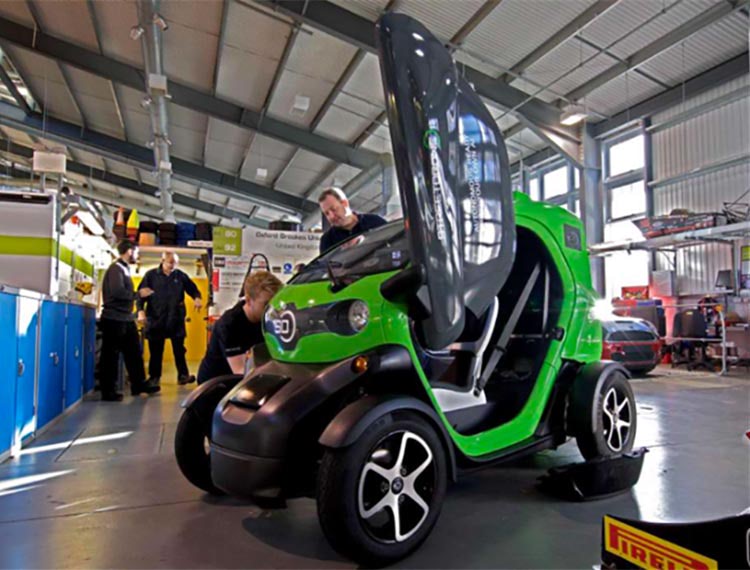Skills shortage within graduates means UK risks getting stuck in driverless car slow lane

A report launched today (19 Sep) by the Centre for Economics and Business Research (Cebr) and StreetDrone, an Oxford-based start-up, reveals that enrolments onto driverless car degree courses is growing by just 2% annually in the UK.
With Freshers’ Week starting in the UK, the report reveals the UK faces a chronic shortage of skilled workers, which could undermine the UK’s ambitions to become a global leader in the field of autonomous vehicle technology.
The UK faces a potentially chronic shortage of skilled workers which could undermine its ambitions to become a global leader in the field of Connected and Autonomous Vehicles (CAV).
Testing of driverless vehicles is already underway on British roads and Chancellor Philip Hammond has pledged that fully driverless cars without a safety attendant on board will be in use by 2021. This is expected to kick start a transition to driverless cars, with the sector predicted to be worth £28bn to the UK economy by 2035, with car ownership becoming “a thing of the past”.
The new analysis reveals that the switch to driverless cars will create 37,300 jobs in the UK by 2035, including almost 10,000 net new positions. These new roles would be in the direct production of driverless vehicles. The report also identifies a large potential for wider job creation associated with improvements to worker productivity facilitated by self-driving cars, as well as modifications to existing infrastructure to accommodate these new types of vehicle.
The report identifies a selection of job types set to be in demand as the CAV sector grows in size. A range of highly-paid technical jobs, such as programmers, software developers and IT professionals are likely to account for a large share of the jobs associated with the design and production of the CAV autonomy package. However, there is also scope for considerable employment in skilled manual professions, for instance in the assembly of the various cameras and sensors that are crucial to the operation of CAVs.
The number of jobs in autonomous vehicle roles is predicted to grow by 9.6% annually from 2020. But the analysis shows the number of enrolments onto relevant UK degree courses is growing by just 2% annually, and apprenticeships by 3.9%. This suggests that at the current rate of growth, there will not be enough young people emerging from university and apprenticeship courses to meet the rising demand for skills in technical fields such as autonomous vehicles in the future.
Furthermore, at present, there are only three undergraduate degrees specifically designed for the industry, all offered by the University of Salford.
Pablo Shah, economist at Cebr, said:
“Annual enrolments onto relevant university degrees and apprenticeships are rising steadily, with around 200,000 entries into computer science, information technology, engineering or manufacturing degrees or apprenticeships. However, if annual enrolments continue to increase at the current rate, they are unlikely to keep up with the expected surge in demand for technical skills that will be generated by the emergence of the CAV sector, and more broadly by the growth of fields such as artificial intelligence and big data.”
Mike Potts, Managing Director of StreetDrone, said:
“Despite claims that artificial intelligence is going to steal people’s jobs, this report reveals driverless technology will actually create thousands of new jobs in the UK. This won’t just be in manufacturing vehicles and developing AI software to run them, but also in industries such as construction, where there will be jobs to build the right public road infrastructure, and in maintenance, where we’ll see skilled jobs to repair and maintain the vehicles.
“If Britain is to be one of the best places in the world to develop, test and sell connected and autonomous vehicles, we need more of the brightest brains studying the subject – at present we’re heading for a colossal skills shortage. That’s why our aim is to get self-driving technology into UK universities, giving more people access to testing at an affordable price. With the right investment and tools, more students and researchers will be able to build and test safety apps, which previously was only available to car companies like Uber and Google.”
The report also reveals the huge economic opportunities for young people in this sector. Future jobs in the autonomous vehicle industry are set to pay higher than the UK average salary – the median annual earnings of programmers and software developers is currently £40,346, compared to the UK average of £23,474.
An analysis of the current gender split in occupations identified as integral to the CAV sector also finds that female participation rates are below 20% in the bulk of these professions. This highlights that measures need to be taken to encourage women to enter these professions if the economic benefits of the CAV sector are be spread more evenly across the workforce.
About StreetDrone: Founded in 2015, StreetDrone is an autonomous vehicle start-up based in Oxford. It builds self-driving test vehicles that help companies and universities to experiment with the software and applications that will take autonomous technology mainstream. Its flagship product, the StreetDrone ONE, is an affordable and accessible electric, autonomous vehicle that can be configured to any organisation’s needs.











Responses